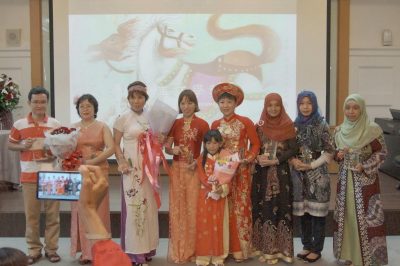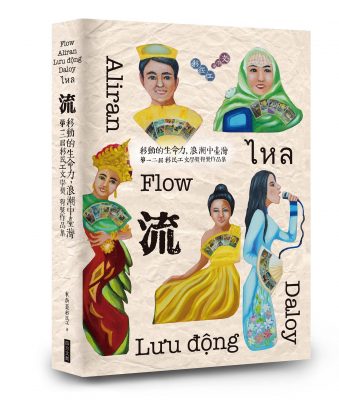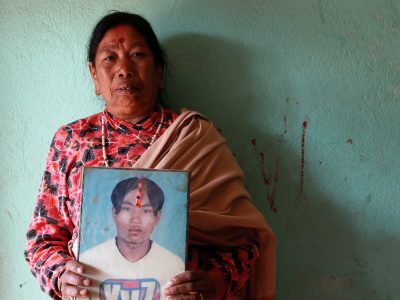In Taiwan, the population of foreign workers and immigrants has been on the rise in recent years and constitutes a significant part of Taiwanese society. The total population in Taiwan is about 23 million; the aboriginal population makes up about 2.3% of the total and there are also about 720,000 foreign workers serving in the industrial and service sectors in Taiwan. A majority of these workers are from Southeast Asian countries, mainly Indonesia, Vietnam, the Philippines and Thailand. Over the past 20 years, the number of spouses from Southeast Asia and their children that are settling in Taiwan has grown in size to around 200,000.
Since 2014, the Taiwan Literature Award for Migrants has been encouraging these foreign-born groups to express themselves in their mother tongues, an effort that has also allowed the Taiwanese people to learn more about these cultures and stories.
The literature award was initiated by Cheng Chang the founder and former editor of 4-Way Voice, a printed and online magazine which publishes news reports in Vietnamese, Thai, Indonesian, Tagalog, Burmese, and Cambodian.

The winners in the first Literature Award for Migrants. Photo credit: the Literature Award for Migrants.
Cheng Chang explained the motivation behind the creation of this literature award:
自我參與《四方報》創報至今,《四方報》做為非華語系移民工資訊交流與紓解鄉愁的平台,不僅是一份服務移民工的母語刊物,更以「友人」身份,傾聽他/她們的聲音,擔起台/外文化溝通的橋樑。自出刊以來,《四方報》即收到大量來自全台各地移民工的投書,平均以每月五、六百封的數量,如雪片般累積。
源鑒於此,我們開始考量移民工自身其實擁有創作的多樣性與豐沛能量,因此希望成立一個更具延展性的文學獎項,讓他們得以藉由書寫,替自己留下歷史,透過文字創作表達兩個故鄉(外籍配偶)、雙重血緣(新住民二代)、與異地漂流(外籍移工)的文學風貌。
Since I founded 4-Way Voice, it has become a platform for migrant workers who do not speak Chinese to exchange information and express their longings for their home countries. It not only serves them as a news report in their mother tongues but it is also a friend who listens to their voices and a bridge that connects the Taiwanese and people from other countries. Since we started, 4-Way Voice has received a lot of letters from migrant workers all over Taiwan — on average about 5,600 letters per month. These letters accumulate like snowflakes.
Therefore, considering the diversity and energy in their creativity, we planned to set up a long-standing literature award so that they can make their own history through writing. They can build up new literature traditions for stories about two home countries (for foreign spouses), about the offspring of two countries (for the second generation), and about diaspora (for migrant workers).
Currently, this literature award receives articles written in Thai, Indonesian, Vietnamese, and Tagalog. Because most of these writers are away from their homeland, many of the stories are about the longing they feel for their family and homeland and their sorrow when they hear of a loved one's death.
Nàng Thơ from Vietnam wrote a letter for her parents:
Ba ơi! Tiếng chuông đồng hồ đã điểm mười hai giờ đêm Đài Loan rồi, không biết nơi quê nhà ba đã ngủ ngon chưa? Hay ba vẫn còn đang phải chống chọi những vết thương mà bấy lâu nay nó vẫn hành hạ ba hay…hay ba còn đang lo lắng cho con gái yêu của ba đang phải tha hương cầu thực nơi đất khách xứ người. Ba biết không nơi phương trời xa lạ này, khi mọi người đã nồng say giấc mộng thì con gái ba lại ngồi gom những suy tư, nỗi nhớ, niềm thương, công việc thường vào DÒNG NHẬT KÝ TRONG ĐÊM. Ba ơi con còn nhớ lắm, nhớ chiều đông năm ấy vì hoàn cảnh gia đình,tương lai con trẻ nên con đành phải dứt tình mẫu tử, nghĩa phu thê để đến miền đất hứa Đài Loan này. […]
Nào ngờ đâu con mới đến Đài Loan mới chỉ tròn tám tháng, chữ hiếu chưa tròn thì nghe tin mẹ mất, gia đình thương con sợ con gục ngã nơi đất khách xứ người không người thân chăm sóc nên gia đình đã giấu không cho con biết rồi con nghe tin qua chị bạn. Ba ơi, lúc đó con như nghe tiếng sét đánh ngang tai trời đất quay cuồng sụp đổ dưới chân con, con choáng váng khụy ngã gọi mẹ…mẹ… mẹ sao mẹ nỡ bỏ con mẹ đi…sao mẹ không cho con biết, giờ con tìm mẹ ở đâu cho được? Mẹ…mẹ ơi! Ngày con đi có mẹ đưa mẹ tiễn, ngày con về chẳng có mẹ đón con…
Dad! The clock just chimed, marking midnight in Taiwan. Are you fast asleep there? Are you struggling with your old wounds?…Are you worried about your beloved daughter who is working in a land far from her people? Dad, do you know that when people are sleeping in this far and foreign land, your daughter sits here and writes down all her thoughts and memories and daily life in the diary at night. Oh father, I miss everything. I miss those afternoons. Because of our family's hardships and my youthful energy, I had to come to the promise land known as Taiwan. […]
How would I know that just after eight months of arriving in Taiwan that Mom would pass away? You were worried that I would be shocked and become sick in the foreign land without the support of loved ones, so our family hid the news from me until I heard it from a friend. Dad, I was so shocked as if I was hit by lightening. I felt dizzy as if the ground crumbled beneath my feet. I cried, Mom…Mom…How could you leave your child…Why didn’t you let me know? Where can I find you? Mom…dear Mom! You waved at me when I left, but when I go home, you will not be there to welcome me.
Some of the pieces are sad stories about their lives in Taiwan. In 2013, several crews from Indonesia killed the Taiwanese captain of the ship. Even though the judge in the case felt that the captain was abusive towards the crew, the people who killed the captain were sentenced to 14 to 28 years in the jail. Tania Roos from Indonesia wrote a story telling us about the fictionalized crew:
Awalnya mereka hanya ingin memberi pelajaran agar Kapten merasa kapok dan babak belur saja. Ketika Kapten lengah, sebuah pukulan besi tumpul dari tangan Sardi melayang menghantam tengkuknya. Kapten terkapar. Mengetahui lawannya tak berkutik, Wasto dan kawan-kawannya terduduk lemas. Mereka puas karena telah membuat Kapten pingsan.
Sejurus kemudian, Sardi iseng mendekati Kapten yang tertelentang berlumuran darah. Dengan teriakan keras, Sardi mundur dua langkah. Lemas dan terduduk. Ia tak mampu berkata apa-apa. Hanya menunjukkan kepada kawan-kawannya jika Kapten tidak bernapas lagi.
Mengetahui hal tersebut, para ABK mulai panik. Ada yang memeriksa nadi Kapten. Ada pula yang mendekatkan telinga ke dada untuk mendengar napasnya. Ada yang menduga Kapten sedang pingsan. Ada pula yang menangis karena ketakutan. Mendengar kepanikan itu, dua orang dari ruang kemudi turut ke luar dan terbelalak mengetahui kejadian yang sebenarnya.
Kapten benar-benar meninggal. Juru mudi melaporkan kejadian ini kepada pos keamanan terdekat. “Kami dijemput polisi air dan akhirnya harus menjalani sidang-sidang yang melelahkan, hingga vonis dijatuhkan. Itu kejadian yang sebenarnya, Bu, kami sangat emosi. Kami sudah di ujung kesabaran.” Ungkap Wasto lirih. Matanya berkaca-kaca.
At first, they just wanted to let the captain know that he was wrong and to teach him a lesson. However, when he wasn't looking, an iron rod, held by Sardi, accidentally hit the captain on the back of his head. He fell down. Learning that their opponent rendered immobile, Wasto and his buddies slumped. They were satisfied to knock him out unconscious.
Soon after, Sardi approached the blood-covered body of the captain. Howling, Sardi took two steps back. Limped and slumped. He was rendered speechless. To his buddies, he pointed to the direction of the lifeless captain.Learning that, the crew was in panic. Someone checked the captain's pulse. Another was trying to hear his breathing. Another thought that he was just unconscious. Another was crying in fear. Hearing the frenzy, two men went out of the steering room. Their eyes were broadened after figuring out what happened. The captain was truly dead. The navigator informed the nearby maritime police station.
The Maritime Police took us away, followed by many tiring trials, and finally the sentence was announced. This is what really happened, ma'am. We were enraged, we had reached the limit of our patience.’ Wasto said softly, with tears in his eyes.

The book ‘Flow’ collects the selected articles in the first and second Literature Award for Migrants. Photo credit: the Literature Award for Migrants.
On the other hand, some of the stories are filled with hope for the future. อนันต์ศรีลาวุธ is from Thailand and he talks about his love for music and making friends:
รายได้ของผมดีพอที่จะคิดหวังอะไรก็ไม่น่าจะเกินฝันในตอนนี้ ลูกทั้งสองได้เรียนในระดับวิทยาลัยซึ่งสมัยผมไม่กล้าแม้นแต่จะฝัน แต่เพราะผมได้พบ “ขุมทองแห่งมิตรภาพ”เช่นตอนนี้ แม้แต่ผมเองที่ไม่คาดคิดก็ยังได้เรียนระดับปริญญาตรีได้อย่างไม่น่าเชื่อ อีกทั้งผมมีเงินพอให้ซื้อกีต้าร์ไฟฟ้า อย่างที่ผมใฝ่ฝันมาตลอดและผมก็ได้มาเล่นมันสมใจ ผมนำมันไปเล่นเพื่อบริการสังคมฟรี ตามที่ต่างๆ รวมทั้งในเรือนจำทั่วไต้หวัน โดยการนำขอ
Now I have the income to make my family live a better life and make my two children go to the college. I even have the opportunity to earn an undergraduate degree. I have money to buy an electric guitar. I like to play it. I brought the guitar to play for social services in various places, including the prisons across Taiwan.
Lê Hoàng Hiệp is a graduate student from Vietnam and he wrote a story about a Vietnamese woman who married a Taiwanese citizen:
Chiều nay, sau khi tan buổi trực ở sở di dân, Dung chạy xe qua trường đón con. Hai mẹ con đi chợ mua ít đồ dùng cho bữa tối rồi về nhà. Con đường chiều nay thật vắng vẻ. Hai bên đường những cây nhãn mới hôm nào nặng trĩu những chùm quả, nay đã xanh mơn mởn những lá non. – Nay ở trường có gì vui không con?
A Hưng nãy giờ vẫn ngồi sau ôm lấy mẹ, nghe hỏi thì bi bô:
– Dạ vui, có mấy anh chị sinh viên đại học tới dạy lớp con làm diều. Có người biết con có mẹ là người Việt Nam nên mới hỏi con biết nói tiếng Việt không. Con nói không, nhưng mà biết hát tiếng Việt, rồi con hát cho mọi người nghe bài “Cháu yêu Bà” mẹ dạy con đó. Ai cũng khen con hát hay.
– Con của mẹ thật giỏi, để mẹ sẽ dạy con nói thêm nhiều tiếng Việt nha
This afternoon, after finishing her job in the immigration office, Dung went to pick up her son at school. The mother and son went to the market to buy some food for dinner before going home. The streets this afternoon are deserted. Those longan trees on the streets were full of fruits before, and now they have green leaves like they were new.
‘Son, was there anything interesting at the school?
Hung was sitting behind and hugging his mom. Hearing the question, he starts talking.
‘Yes. Some college students came to our class and taught us how to make kites. After they knew that I have a Vietnamese mom, they asked me whether I could speak Vietnamese. I said no, but I can sing Vietnamese songs. Then I sang the song you taught me, ‘I love grandma’. Everyone said I sang very well.’
‘My son is so gifted. I'm going to teach you more Vietnamese later.’
Some stories are about tragic incidents that shocked the whole country. In 2014, a mass stabbing spree took place in the Taipei Metro and Erin, from Indonesia, wrote a story inspired by the event.
Kulihat pemuda berbaju merah membabi buta mengayunkan pisau dan menusuki siapa saja yang ada dalam jangkauannya. Orang-orang yang terkena amukannya berjatuhan. Yang masih bisa berlari segera menyingkir sambil melemparkan apa saja pada pemuda itu. Aku dan Kakek bergerombol dengan beberapa lansia di ujung gerbong, yang sialnya buntu! Gawat sekali.
Entah berapa orang yang bergelimpangan berdarah-darah di lantai kereta metro itu. Aku gemetar hebat. Maut serasa mengintaiku. Kurundukan badan merendah di belakang kursi roda. Ah, sebuah usaha sembunyi yang sia-sia. Tapi sungguh aku takut sekali. Tak terbayangkan akan mengalami tragedi ketika jauh dari tanah air dan keluarga sendiri.
I saw a young man in red clothes waving his knife aimlessly and trying to kill everyone close to him. Several people fell down after being stabbed by him and others tried to run away as soon as possible. They threw things at that guy. Grandpa [who I take care of as my job] and I and other elder people were at the end of that cart, but we had no way out! We were doomed!
I did not know the number of people lying in their blood on Metro. I was thrilled. I felt the God of Death looking at me. I curled my body behind a wheelchair. Oh. I tried to hide myself helplessly. But I was very scared. I did not expect to experience such tragedy in a place so far away from my family and hometown.
Nanik Riyati is from Indonesia and she wrote a story about the hijab:
Suatu hari Siauce mendapatiku berhijab. Mimik wajahnya menunjukkan ketidaksukaannya dan menyuruhku untuk melepaskannya. Dia masuk ke kamar dan memanggilku sambil membuka youtube dan menjelaskan tentang adat upacara kematian orang Cina.
Dengan kesedihan dan kekecewan terpaksa ku lepas hijabku dan berpakaian seperti biasa, tetapi dalam hati, aku tetap berkeinginan untuk berhijab dan menjadi muslimah yang baik.
Aku mulai istikamah berdoa dan berusaha mencari informasi bagaimana caranya agar bisa berhijab menjalankan perintah Allah dan tetap bekerja dengan baik. Rasa iri dan sedih setiap kali melihat teman-teman bisa bebas berhijab selalu terbesit. Dalam hati hanya bisa berucap, “Ya Allah semoga suatu saat aku diperbolehkan berhijab”.[…]
Tiba-tiba aku teringat akan surat yang Ah-kong tulis buatku. Maka di sela-sela kesibukan mengerjakan tugas kuliah, kutulis sebuah surat dengan bahasa Inggris dengan vocabulary yang pas-pasan dan grammarnya yang tidak lengkap. Akan tetapi aku yakin Siauce memahami isi suratku.
Ku jelaskan kewajiban wanita muslimah untuk berhijab itu diperintahkan langsung oleh Allah dan keutamaan wanita yang berhijab dan taat beragama pasti akan lebih sabar dalam mengurus orang tua, lebih ikhlas dalam bekerja dan jujur.
Selesai kerja kuberikan surat yang sudah kupersiapkan dan aku masuk kamar untuk melaksanakan salat isya. Tiba-tiba pintu kamar terbuka, Siauce berlari memelukku dengan erat sambil menangis. Diciuminya rambutku sambil berkata:
“You can wear hijab. You can wear your dress. You can pray, you can study, you can do anything you like, but don’t leave us and please take care of Ah-kong, because he loves you and likes you. If this was your reason to go home please stay here and do as your Allah asked you to do. I allow you and I will explain to Ah-kong and my brother.”
“If you have something to talk, just tell me and we can communicate”.
Spontan aku bersujud dan menangis. Ku peluk erat tubuh Siauce, ku anggukkan kepala dan aku setuju untuk menambah kontrakku, di samping aku bisa melanjutkan kuliahku dan melunasi hutang-hutangku. Terima kasih ya Allah, ternyata benar, kalau kita berdoa dengan istiqamah, berusaha tanpa henti Allah pasti akan mengabulkan doa kita.
One day, the daughter of my boss saw me wear hijab. She looked unhappy and told me to take it off. She asked me to go to her room and let me see a video on Youtube. She explained to me the Chinese funeral customs [and how a hijab might look like something used in the funeral]. I felt very sad and depressed because I was asked to take off my hijab. I wear what I used to wear, but in my mind, I want to wear my hijab and be a good Muslim.
I started to pray and looked for any way to obey Allah and kept doing my job. I felt envy and sad when I saw my friends wearing hijab freely. I could only tell myself, ‘Allah, I hope one day I will be allowed to wear my hijab.’[…]
Suddenly, I remember the letter grandpa wrote to me. When I was busy doing homework assigned in the school, I wrote to the daughter of my boss in simple English. I believe she can understand what I wrote in the letters. I explained the duty of Muslims. Wearing hijab is an order from Allah, and it is the most important principle for women to obey the religion, which will make me more patient to take care of her grandpa, kinder, and more honest.
After finishing my duty, I gave her the letter I prepared, and then I came back to my room and prayed. Suddenly my door was opened, she ran in and held me. She kissed my hairs and said, ‘You can wear hijab. You can wear your dress. You can pray, you can study, you can do anything you like, but don’t leave us and please take care of Ah-kong, because he loves you and likes you. If this was your reason to go home please stay here and do as your Allah asked you to do. I allow you and I will explain to Ah-kong and my brother.’
I cried happily on my knees. I held her tightly and agreed to expand my contract. In addition to continue my education in the college, I can pay back my debt. Thanks Allah. This is true. If we pray with our heart and keep working, Allah will answer us.
And finally, Filipina Wala's beautiful words can perfectly sum up the spirit of the literature award:
Gusto kong maging hinog sa karanasan sa buhay dito upang maibahagi ko rin ang aking kaalaman sa aking mga kababayan sa Pilipinas. Babalikan ko rin ang pagsusulat. At sa pagkakataong ito, sarili ko namang kwento ang isusulat ko. Ang mga karanasan ko ay pinagyaman na ng iba’t ibang kulturang natutunan ko.
Ang puso ko ay pinagtibay na ng hangaring matupad ang aking mga pangarap at mabigyan ng magandang buhay ang aking pamilya. Kung hindi ako umalis ng aking bansa, hindi ko matutuklasan na dito sa Taiwan, marami rin akong kapatid na Pilipino na dito na nakahanap ng pag-ibig at bumuo ng sariling pamilya. Na pwede pala na magkaibigan ang dalawang lahi magkaiba man ang kanilang kulturang kinagisnan.
Malayo pa ang biyaheng tatahakin ko rito ngunit kampante na ang puso ko sa pangalawang tahanang nahanap ko sa bansang ito. Lahat ng pangarap ko ay matutupad kahit paunti-unti at mabagal lang. Wala naman ng mas sasarap pa sa katas ng iyong pinaghirapan matagal man ang kailangang hintayin.
Hindi man ako nakakuha ng propesyonal na trabaho rito, naging saludo naman ako sa lahat ng mga ordinaryong manggagawa dito sa Taiwan. Hindi biro ang aming trabaho. Balewala ang talino kung hindi ito sasamahan ng tiyaga at pasensya.
At sa tuwing nalulungkot ako, iniisip ko na bawat araw na lumilipas ay isang araw na palapit nang palapit sa oras na makikita ko nang muli ang ngiti ng aking ina at mahahagkan ang aking pamilya.
“Lolo, nakarating na ako sa dulo ng bukid. Hindi ko ito nilakad kagaya ng pinag-usapan natin. Natuklasan ko kasi na kaya ko pa lang lumipad. Salamat sa’yo na unang nagturo sa akin na kaya kong gawin ang lahat ng kaya kong isipin. Natuklasan ko rin na sa dulo ng bukid ay may panibagong mundo pang naghihintay. Na sa bawat katapusan ay may panibagong simula.”
I want to experience life here to the fullest so that I can share this knowledge with my fellow Filipinos back in the Philippines. I will continue my writing. But this time, I will write my own story, a life story that has been enriched by different cultures.
To realize my dream and to bring a bright future to my family, my heart has been stronger. If I didn’t leave my country, I will never discover that here in Taiwan, I also have fellow Filipinos who found love and built their own families. That it is possible for people to be friends with those who belong to a different race and culture.
This is still a long trip for me here but my heart is at ease in this second home I found in this country. Step by step, all my dreams will come true. There is nothing better than to see the fruit of all my hard work even if this means I have to wait for a long time.
Even if I was unable to get a white-collar job here, I want to salute all ordinary workers in Taiwan. Our job is not easy. Without perseverance and endurance, we cannot make it no matter how smart we are.
Every time I feel sad, I just think that each passing day is a day closer when I finally get to see the smile of my mother and embrace my family.
‘Grandpa, I reached the end of the fields. I did not walk like we discussed because I found that I can fly. Thank you for being the first to teach me that I can do whatever I want to do. I also learned that there is a new life waiting at the end of the field. Every ending is made for a new start.
Acknowledgment: Special thanks to Global Voices’ Southeast Asia team, including Mong Palatino, Juke Carolina, and Don Lê, for helping to revise the translation.




